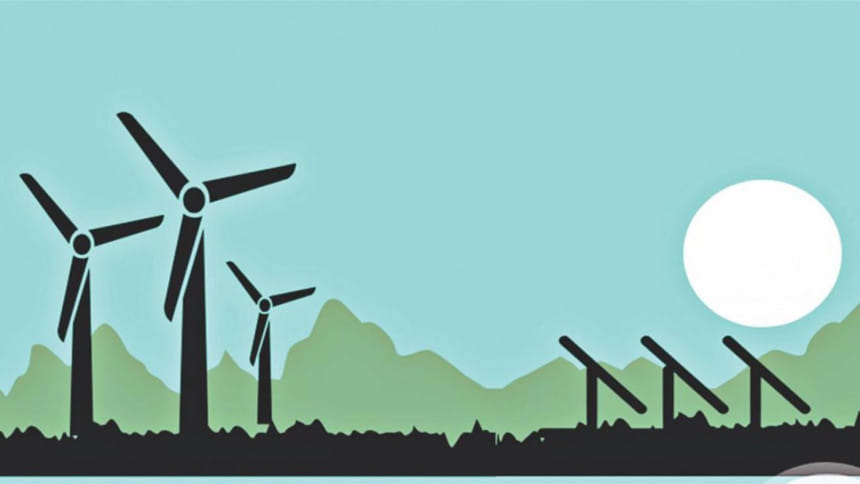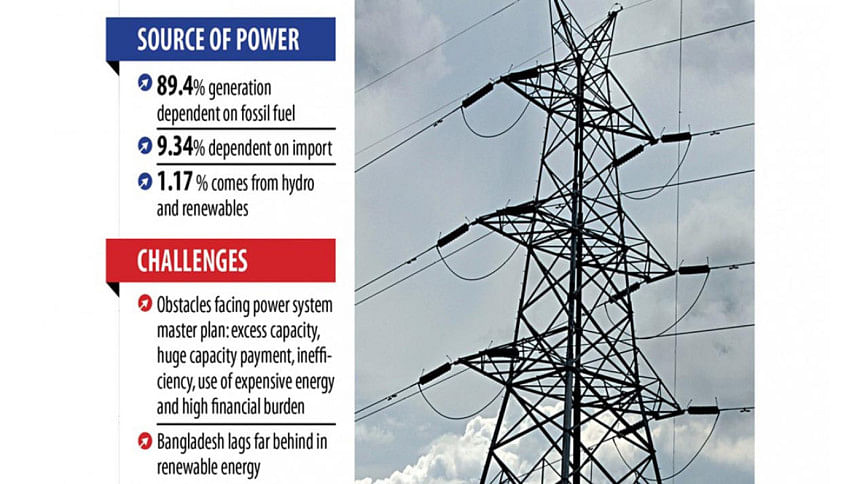Master plan must help phase out fossil fuel-based power: CPD

The government's proposed master plan on power and energy should help Bangladesh phase out fossil-fuel-based and expensive generation system and guide it towards cleaner electricity, the Centre for Policy Dialogue (CPD) said yesterday.
On Sunday, the government signed an agreement with the Japan International Cooperation Agency (Jica) for a new power system master plan, with a vision to promote a low or zero-carbon transformation of the total energy supply and demand system.
The decision to prepare the master plan is a welcome move, said the CPD.
This is particularly important when Bangladesh is in the process of the energy transition with a view to scaling down the use of fossil fuel and boosting the use of renewable energy.

"Overall, the next plan must show a clear path towards energy transformation in Bangladesh," said CPD Research Director Khondaker Golam Moazzem while making a presentation during a virtual dialogue.
The think-tank organised the programme titled "Proposed Power System Master Plan (PSMP): Challenges of Projecting Rationale Electricity Demand".
Naoki Ito, Japanese ambassador to Bangladesh, said: "Recently, we engaged in drafting a master plan to develop the energy sector of Bangladesh."
The master plan project aims to promote a low or zero-carbon transformation for all forms of energy by maintaining a stable supply of energy and ensuring economic viability.
It will also strengthen the capacity for policy and planning development and energy data management, he said.
"We also need to address areas such as climate change and focus on the energy mix."
Mohammad Hossain, director-general of the Power Cell under the power division, said: "We are lagging far behind in renewable energy. But we are gradually advancing towards our target."
Without coal-based and nuclear power plants, Bangladesh will not be able to meet electricity needs, he said.
However, through long-term planning, attention is gradually focusing on the zero-carbon transformation of the total energy system, he said.
In a paper, the CPD said the power sector needed to address several emerging challenges in view of the Covid-19 pandemic.
The challenges include excess capacity, huge capacity payment, inefficiency, the use of expensive energy, and a higher financial burden.
The new plan should be drafted considering the limitations of the previous plans and should aim to reduce excess installed capacity in a phased manner and transition to clean power by gradual phase-out of fossil fuel and phase-in of renewable energy, the paper said.
The plan should strictly mention about no-extension of quick rental power plants after the existing contracts expire and the discontinuation of power plants that are dated and inefficient and are using expensive energy.
The plan should discourage new investment for generation, particularly through fossil fuel and LNG, and should highlight investment in transmission and distribution of electricity, it said.
The new plan is expected to prioritise gradual phase-out from the administered power tariff to the market-based ones.
"Necessary protection should be ensured for the target groups such as low-income people and SMEs," the CPD said.
The Bangladesh Energy Regulatory Commission should be more transparent and independent in making decisions regarding setting power tariff, it said.
Given the development of the power and energy sector, the plan should suggest repealing the "Speedy Supply of Power and Energy Act" immediately, the CPD said.
Moazzem said the importance of formulating a new master plan increased due to aggravated structural and operational challenges and changing power demand amidst the Covid-19 pandemic.
About 89.4 per cent of the net generation of energy in Bangladesh is directly dependent on fossil fuel.
"So, it is tough to implement a low or zero-carbon system. But it is a good initiative for the sector," the economist said.
CPD Distinguished Fellow Mustafizur Rahman moderated the dialogue.
Mohammad Alauddin, chairman of the Sustainable & Renewable Energy Development Authority, M Tamim, professor for petroleum and mineral resources engineering at the Bangladesh University of Engineering and Technology, Ijaz Hossain, a professor for chemical engineering at the Buet, and Anu Muhammad, a professor of economics at Jahangirnagar University, also spoke.

 For all latest news, follow The Daily Star's Google News channel.
For all latest news, follow The Daily Star's Google News channel. 



Comments